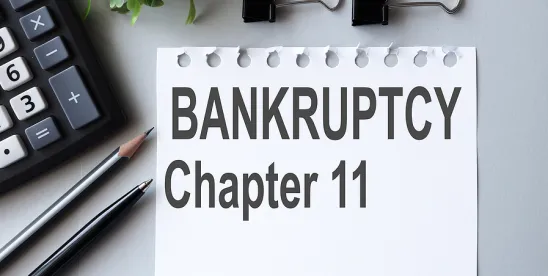For banks and financial institutions, navigating bankruptcy proceedings is a critical part of managing credit risk — especially when dealing with small business borrowers. Subchapter V of Chapter 11, introduced under the Small Business Reorganization Act, offers a streamlined path for debtor reorganization but limits certain rights traditionally held by secured lenders. Understanding how these changes impact loan recovery strategies, collateral protection, and guarantor enforcement is essential for banks seeking to protect their interests in a post-default environment.
Frequently Asked Questions in Bankruptcy
What is a Subchapter V bankruptcy, and how do I protect my rights as a secured creditor?
Subchapter V is an alternate, debtor-friendly pathway for “small business debtors” in Chapter 11. The current debt limit for a small business debtor is $3,024,725 (down from a temporary increase to $7.5 million during the pandemic). Subchapter V is intended to offer a streamlined or fast-track process for small business debtors to get through the Chapter 11 process. Unfortunately, this result is accomplished through the loss of critical creditor protections that would exist in a normal Chapter 11 case, such as the absolute priority rule (requirement that the creditors be paid in full before equity can retain its interest) and the necessity of an accepting class in order to confirm a plan (a Subchapter V plan can be confirmed even if all creditors object).
With the loss of the more powerful creditor protections, how do you protect your rights when you are undersecured and the debtor proposes a plan that attempts to value your collateral and pay little to nothing on the unsecured portion?
The answer often lies in an overlooked section of the code: 1111(b). The Section 1111(b) election allows a lender to treat the entire amount of its allowed claim as secured. Once that election is made, the plan must pay the entire amount of the claim over the life of the plan, with that stream of payments having a present value of no less than the value of your collateral. So, for example, if you are owed $200,000 secured by a property worth only $100,000, then the plan must make payments to you over its life in an aggregate amount totaling at least $200,000 and with that stream of payments having a net present value of no less than $100,000. There are two important restrictions on the availability of the 1111(b) election. First, it is only available if the property is going to be retained by the debtor (as opposed to being sold). Second, the election is unavailable if the collateral is of “inconsequential value.” In our example, the collateral value of $100,000 would not be deemed to be inconsequential in relation to the total debt amount. However, if the collateral instead had a value of $10,000, that would likely be deemed inconsequential.
The entity that owns my collateral filed for bankruptcy. Can I still pursue the guarantors?
Generally speaking, yes. The automatic stay does not — on its own terms — extend to nondebtors. However, there are two exceptions to this rule:
- If the debt is a consumer debt and the debtor filed for Chapter 12 or 13 bankruptcy relief, then there is a co-debtor stay that extends to co-obligors.
- It is possible to seek an extension of the automatic stay to nondebtors in a Chapter 11 case (based upon the court’s inherent equitable powers). However, in order to do so, the debtor must take the affirmative action of filing a request for such relief and then demonstrating that “extraordinary circumstances” exist to warrant the extension of the automatic stay. Absent a positive ruling on such a request, you are free to pursue the nondebtor guarantors while the entity debtor is in Chapter 11.
As Subchapter V continues to shape the bankruptcy landscape for small businesses, banks must be prepared to adapt their credit recovery approach. From evaluating Section 1111(b) elections to pursuing guarantor claims outside the bankruptcy estate, financial institutions must act decisively to preserve value. By staying informed and strategically engaged, banks can maintain strong creditor positions even within this debtor-friendly framework.




 />i
/>i
